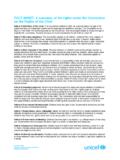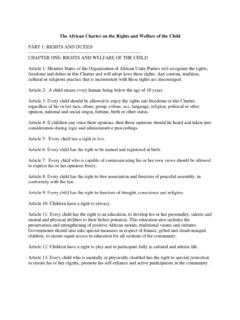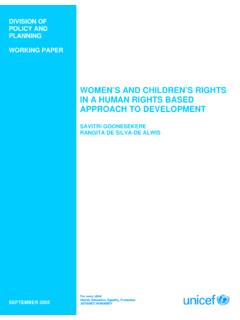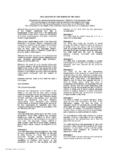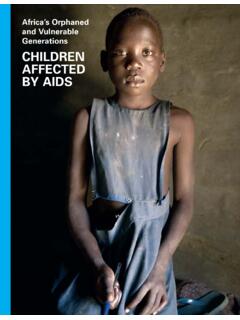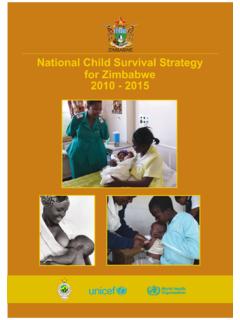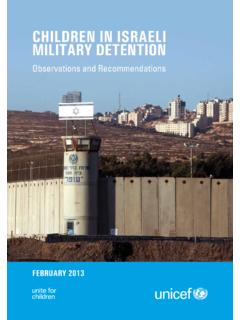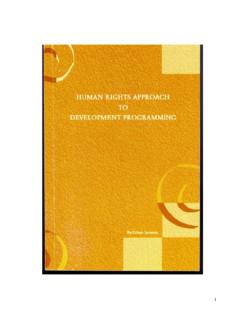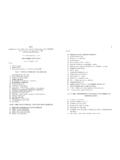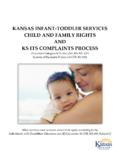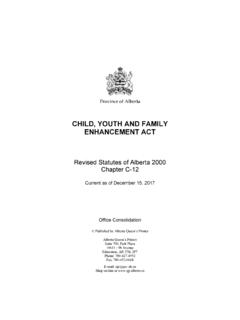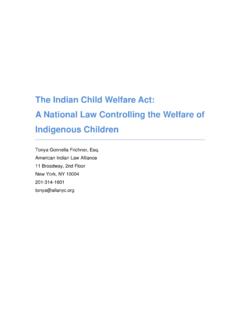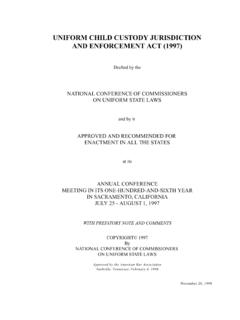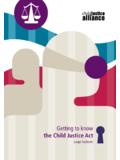Transcription of UNICEF Factsheet on the Child's Rights Act in Nigeria
1 Nigeria Country Programme August 2007 INFORMATION SHEET The child s Rights Act August 2007 Background When the various human Rights documents are considered, even though they are applicable to all human beings, they are not necessarily child specific and fail to address the peculiar needs of children. For the Rights of the child , an International law or International Convention was required. On 20th November 1989, the United Nations General Assembly adopted the Convention on the Rights of the child (CRC), whilst the OAU Assembly of Heads of States and Governments adopted the African Union Charter on the Rights and Welfare of the child (CRCW) in July 1990.
2 Nigeria has signed both International Instruments and had ratified them in 1991 and 2000 respectively. Both international instruments contain universal set of standards and principles for survival, development, protection and participation of children. It reflects children as human beings and as subjects of their own Rights . The Convention on the Rights of the child (CRC) outlines the human Rights to be respected and protected for every child under the age of 18 years and requires that these Rights are implemented. Domestication of the Convention on the Rights of the child : the child s Rights Act The Convention on the Rights of the child enjoins that Member States shall undertake to disseminate the Conventions principles and take all appropriate legislative, administrative and other measures for the implementation of the Rights recognized in the present Convention.
3 Against this background, a draft child s Rights Bill aimed at principally enacting into Law in Nigeria the principles enshrined in the Convention on the Rights of the child and the AU Charter on the Rights and Welfare of the child was prepared in the early 90 s. But it is only after about ten years with several Heads of Government and heated debates by the Parliamentarians that the Bill was eventually passed into Law by the National Assembly in July 2003. It was assented to by the President of the Federal Republic of Nigeria , Chief Olusegun Obasanjo in September 2003, and promulgated as the child s Rights Act 2003.
4 Structure and Content of the CRA The structure of the child s Rights Act 2003 (CRA) has been informed by the mandate to provide a legislation which incorporates all the Rights and responsibilities of children, and which consolidates all laws relating to children into one single legislation, as well as specifying the duties and obligations of government, parents and other authorities, organizations and bodies. Definition of a child The Act defines a child as one who is below the age of eighteen years. It categorically provides that such a child s best interests shall remain paramount in all considerations.
5 A child shall be given such protection and care as is necessary for its well being, retaining the right to survival and development and to a name and registration at birth. Basic Provisions of the CRA Provisions of freedom from discrimination on the grounds of belonging to a particular community or ethnic group, place of origin, sex, religion, the circumstances of birth, disability, deprivation or political opinion; and it is stated categorically that the dignity of the child shall be respected at all times. No Nigerian child shall be subjected to physical, mental or emotional injury, abuse or neglect, maltreatment, torture, inhuman or degrading punishment, attacks on his/her honor or reputation.
6 Nigeria Country Programme August 2007 Every Nigerian child is entitled to rest, leisure and enjoyment of the best attainable state of physical, mental and spiritual health. Every government in Nigeria shall strive to reduce infant mortality rate, provide medical and health care, adequate nutrition and safe drinking water, hygienic and sanitized environments, combat diseases and malnutrition, support and mobilize through local and community resources, the development of primary health care for children. Provisions for children in need of special protection measures (mentally, physically challenged, or street children): they are protected in a manner that would enable them achieve their fullest, possible social integration, and moral development.
7 Expectant and nursing mothers shall be catered for, and every parent or guardian having legal custody of a child under the age of two years shall ensure its immunization against diseases, or face judicial penalties. Betrothal and marriage of children are prohibited. Causing tattoos or marks, and female genital mutilation are made punishable offences under the Act; and so also is the exposure to pornographic materials, trafficking of children, their use of narcotic drugs, or the use of children in any criminal activities, abduction and unlawful removal or transfer from lawful custody, and employment of children as domestic helps outside their own home or family environment.
8 child abduction and forced exploitative labor (which is not of a light nature) or in an industrial undertaking are also stated to be offences. The exceptions to these provisions are where the child is employed by a family member, in work that is of an agricultural or horticultural or domestic in nature, and if such a child is not required to carry or move any thing heavy that is likely to adversely affect its moral, mental, physical spiritual or social development. Buying, selling, hiring or otherwise dealing in children for purpose of begging, hawking, prostitution or for unlawful immoral purposes are made punishable by long terms of imprisonment.
9 Other offences considered grave include sexual abuse, general exploitation which is prejudicial to the welfare of the child , recruitment into the armed forces and the importation /exposure of children to harmful publications. It further preserves the continued application of all criminal law provisions securing the protection of the child whether born or unborn. Children s responsibilities Children under the Act, are also given responsibilities which include working towards the cohesion of their families, respecting their parents and elders, placing their physical and intellectual capabilities at the service of the State, contributing to the moral well being of the society, strengthening social and national solidarity, preserving the independence and integrity of the country, respecting the ideals of freedom, equality, humaneness, and justice for all persons.
10 Relating with others in the spirit of tolerance, dialogue and consultation, and contributing to the best of their abilities solidarity with and unity with Africa, and the world at large. To these end, the Act mandates parents, guardians, institutions and authorities in whose care children are placed, to provide the necessary guidance, education and training to enable the children live up to these responsibilities. child Justice The Act, makes provisions for the establishment of Family Courts . The courts which will operate at the High Court and Magistrate Court levels have been vested with the jurisdiction to hear all cases in which the existence of a legal right, power, duty, liability, privilege, interest, obligation or claim in respect of a child is in issue, and any criminal proceeding, relating thereto.
